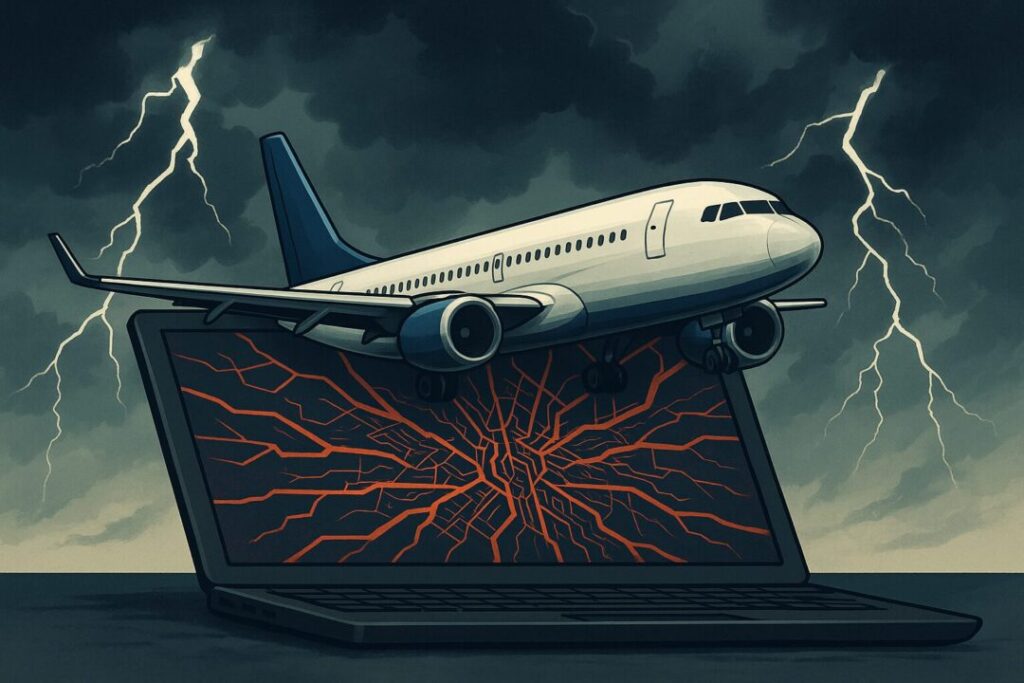It was a rough week for air travelers; and a revealing one for anyone paying attention to how fragile our high-tech systems really are.
On Saturday night, July 20, Alaska Airlines had to ground every one of its flights after a major computer system failed.
Just two days earlier, a Delta Connection flight narrowly avoided a mid-air collision with a U.S. Air Force B-52 bomber over North Dakota.
Nobody was hurt in either case, thankfully, but both incidents raised serious questions about the systems we rely on to keep us safe in the sky – and what happens when those systems break down.
NEW: Delta pilot makes an “aggressive maneuver” to avoid colliding with a B-52 bomber above Minot, North Dakota.
New audio footage captured by a passenger onboard the plane reveals what exactly happened, according to the pilot.
“Given his speed … I don’t know how fast they… pic.twitter.com/Hos687fZRm
— Collin Rugg (@CollinRugg) July 20, 2025
The Alaska Airlines Tech Meltdown
The Alaska Airlines outage began around 8 p.m. Pacific Time. A critical software system used for flight dispatch and weight/balance calculations went down, affecting both Alaska and its regional partner, Horizon Air.
The result? A system-wide ground stop. Over 200 aircraft were frozen in place.
Flights were delayed or canceled across the country. The FAA got involved, and while the ground stop was lifted after about three hours, the ripple effects stretched into the next day.
The airline said it was sorry and urged people to check flight statuses, but passengers who sat on the tarmac for hours weren’t exactly feeling patient.
This wasn’t a one-time thing, either. Back in September 2024, Alaska had another system-wide glitch. That one was due to a problem with a digital certificate.
Still, same result: grounded planes, stranded passengers.
The Delta Near-Collision
Just two days earlier, on July 18, a Delta Connection flight operated by SkyWest came dangerously close to a mid-air collision near Minot, North Dakota.
Passengers reported feeling the plane suddenly bank sharply during final approach. A U.S. Air Force B-52 bomber was in the area, and the Delta pilot had no idea it was there until the last second.
According to the pilot, nobody in the tower warned them. He told passengers afterward that the radar system wasn’t working or wasn’t being used.
The FAA is now investigating, but details are still unclear.
What’s known is this: a commercial jet and a military bomber came far too close for comfort.
Why We’re Talking About It
These two events may seem different, but they share a common theme: systems that are too centralized, too fragile, and too reliant on technology or government coordination.
1. Centralized Systems Are Fragile
The Alaska outage shows what happens when a giant company puts all its eggs in one digital basket. A single IT failure brought down the whole airline.
That’s exactly why conservatives warn against relying on centralized systems, whether it’s voting machines, airline software, or national power grids.
2. Let the Free Market Fix It
Alaska Airlines is a private company. It should be held accountable by the market, not new government regulations.
If passengers are unhappy, they’ll fly with someone else. That’s how private companies improve – through competition, not more red tape.
3. Civil-Military Coordination Matters
In the Delta case, a near-miss with a military plane shows that government coordination isn’t always what it should be.
Why wasn’t the radar working? Why didn’t the tower warn the pilot?
Conservatives argue that instead of layering on new regulations for airlines, we should be asking hard questions about how government-run airspace is managed.
4. Cybersecurity and National Security Still Matter
While the Alaska issue hasn’t been linked to hacking, the lack of transparency raises concerns, especially with recent airline cyberattacks (like Hawaiian Airlines in June).
Conservatives want stronger cybersecurity in the private sector and closer scrutiny of foreign tech involvement.
Two airline emergencies in just a few days – one caused by a software breakdown, the other by a shocking communication failure in the sky.
It’s a warning sign that our systems, both private and public, aren’t as strong as they should be.
Instead of more government interference, we need smarter, more secure, and more resilient systems built by private innovators and backed by accountability, not bureaucracy.
This article was written with the assistance of AI. Please verify information and consult additional sources as needed.




